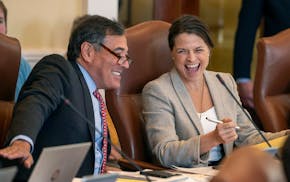A bipartisan panel of political elders Thursday offered its own solution to Minnesota's budget mess: Cut spending and raise taxes "for everyone."
"Everyone in Minnesota needs to contribute to the budget solution," said the group, which included former legislators and former state finance commissioners. Begun over the weekend by former Democratic Vice President Walter Mondale and former Republican Gov. Arne Carlson, the group proposed reducing spending by $3.6 billion and hiking revenue by $1.4 billion to erase Minnesota's projected $5 billion deficit.
Their plan had no immediate impact on the state's now week-old government shutdown, which was brought about by a budget gridlock at the Capitol. DFL Gov. Mark Dayton praised the panel's speedy work but said he would not increase income taxes on everyone; Republican House Speaker Kurt Zellers dismissed the proposal as "not a solution."
"It is a retread of failed tax-and-spend policies," Zellers said.
Meanwhile, a New York bond rating agency delivered a scathing report Thursday on the state's budget situation, meant to serve as a warning shot to both sides of the dispute.
Fitch Ratings downgraded the state's creditworthiness, saying the shutdown, years of bickering and deals filled with budget shifts and gimmicks have made Minnesota a greater credit risk.
The credit downgrade means that it will cost the state and local governments more to borrow new money for construction and other projects.
The group of political elders, who shared their report with Dayton and Republican legislative leaders before it was released, highlighted Minnesota's "long-term financial challenges" in their recommendations.
They proposed spending reductions and a three-year, 4 percent tax increase on all Minnesotans, along with cigarette and liquor tax increases. Longer term, they proposed lowering and broadening the state's sales tax, an idea that has rattled around the Capitol for years.
Former state Sen. Steve Dille, a Republican and co-chairman of the commission, said he suspected how those proposals would be received.
He said he knew that higher taxes were "probably a non-starter. But I told Arne [Carlson] I'd give it a shot and try.
"Not every Republican is at the far right end, saying no tax increases whatsoever. Some, including me, are looking to a more moderate approach," he said. He retired from the Legislature last year after 24 years at the Capitol.
Buoyed by a group of feisty conservative freshmen, the current Republican leaders firmly object to any tax increase.
Even before the panel's report was released, they reiterated their anti-tax message Thursday. In a letter to Dayton, Zellers and Senate Majority Leader Amy Koch rejected the governor's Wednesday proposals to cut spending, raise health surcharges, and either temporarily increase taxes on people who earn $1 million or more a year or raise cigarette taxes by $1 per pack.
"After months of negotiating in which we have stated very clearly that there are not the votes to pass tax increases in the Legislature, you proposed two options both with tax increases," they said. "We stand ready to negotiate a budget solution which does not raise taxes and puts our state on track for long-term fiscal sustainability."
That leaves the budget situation where it has been for months. "Republican legislators remain adamantly opposed to making our state tax system fairer," Dayton said Thursday. "The Republicans in the state Legislature have received three compromise proposals in the past 24 hours -- two from me and one from this very distinguished committee. Now it is their responsibility either to accept one of them, or else to present their own alternative proposal."
Zellers and Koch did not make a public counteroffer to Dayton's plan from Wednesday.
Republican lawmakers and the governor, along with his education experts, held a private meeting in the morning to pore over their differences in the area of education. Their comments afterward pointed to continued failures to communicate.
Republican lawmakers emerged from the meeting upbeat about a "productive" discussion on the largest slice of the state's budget. Rep. Mindy Greiling, the DFL lead on the House Education Finance committee, had the opposite reaction.
Committee Chairman Pat Garofalo, R-Farmington, "said at the very beginning that if we don't have agreement on policy there will be no bill," Greiling said. "And we had no agreement on policy."
The rancor has reached as far as New York's financial district. Fitch's report said that Minnesota's economy remains fundamentally strong, but that one-time payment deferrals "have been larger than those of the past."
Those decisions were made before Dayton or the current Republicans were in office. Fitch's analysts raised concerns about the shutdown, as well, and said that "budget decision-making has become increasingly contentious over time."
"This downgrade is the result of several budgets in which the state didn't act to address its structural deficit," said Minnesota Management and Budget Commissioner Jim Schowalter. "The best we can do now is to resolve the budget debate in a timely fashion and in a manner that addresses our long-term financial stability.
"In the eyes of the marketplace, we are slipping," he said.
Staff writers Eric Roper and Baird Helgeson contributed to this report. Rachel E. Stassen-Berger • Twitter: @rachelsb
The Latest | 12 jurors and 1 alternate seated in Trump hush money case

Rep. Ilhan Omar's daughter suspended from college for involvement in pro-Palestinian protests
